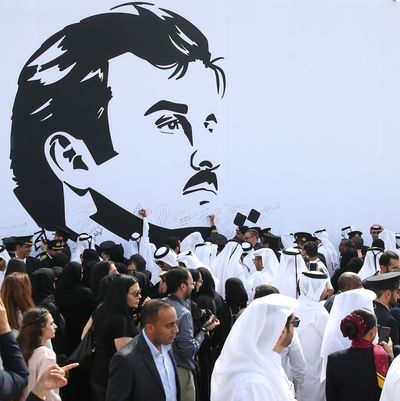
One of the key events leading up to the siege imposed on Qatar by Saudi Arabia, the United Arab Emirates, and several other Arab states last month was the hacking of Qatar’s state news agency by then-unidentified actors who planted false quotes attributed to the Qatari emir Tamim bin Hamad al-Thani. In the apparently apocryphal remarks, the emir praised Iran and Hezbollah (but also Israel?) and disparaged the United States. The attack seemed calculated to drive a wedge between tiny, rich Qatar and the U.S., which has an important military base there, as well as to lend credence in the Arab world to the Saudi and Emirati governments’ claims that Qatar was a bad neighbor and a regional troublemaker.
For Arab potentates looking for reasons to pick a fight with Qatar the unbelievable statements planted in the Qatari press were too good to be true, so it came as little surprise when a report emerged this week citing U.S. intelligence officials as saying the U.A.E. had orchestrated the hacking (in contrast to an early CNN report suggesting it was Russia). As the Washington Post’s Ishaan Tharoor points out, this is not the first time in recent years that fake news reports have led to diplomatic crises in the Persian Gulf, but this time, the consequences were more than usually severe.
Indeed, much of the rift between Saudi Arabia and the U.A.E. on the one hand and Qatar on the other concerns control of the Arab media landscape, with all parties understanding the value of the power to disseminate information (true or false) and shape public perceptions and narratives of regional events. One of the most telling demands listed in the ultimatum Saudi Arabia and its allies presented to Doha in late June was that its government shut down Al Jazeera, the state-owned broadcast network with an international reach that Qatar has used to great effect to project its influence throughout the region and the world.
Al Jazeera is despised by Saudi Arabia, the U.A.E., and other Arab governments for its habit of muckraking about their misdeeds while ignoring or soft-pedaling Qatar’s, for its supportive coverage of the Arab Spring uprisings, and for its perceived bias toward Iran and Islamist groups like the Muslim Brotherhood, Hamas, and Hezbollah. When I worked as a newspaper editor in Jordan, my colleagues often complained that Al Jazeera had an agenda against their country, which it often depicted as a more oppressive dictatorship than it really is and criticized for maintaining a peace treaty with Israel. Not incidentally, Jordan revoked the broadcaster’s media license last month, as part of a downgrade of relations with Qatar.
Al Jazeera’s main competitor, meanwhile, is Al Arabiya, which is based in Dubai and owned by the Saudi conglomerate MBC. MBC is owned by Waleed al-Ibrahim, a Saudi billionaire with kinship ties to the royal family, and his nephew prince Abdul Aziz bin Fahd. Al Arabiya is widely understood to have been founded deliberately as a rival to Al Jazeera that would counterbalance the Qatari network’s criticism of the Saudis with coverage more favorable to the Saudi–Emirati Establishment. In a part of the world where independent media is vanishingly thin on the ground, state-owned or oligarch-owned conglomerates play an outsize role in politics and diplomacy by influencing what the public knows and thinks. Because everyone from Morocco to Iraq consumes media in the same language, a major Arabic media property can wield influence in some 22 countries, including a number of extremely volatile ones.
That’s why the deployment of “fake news” in the Arab world’s media war is so chilling. The use of misinformation to start diplomatic crises and wars is of course as old as diplomacy and war, and the Middle East has its own rich history of governments and non-state actors planting stories in the press to lie, mislead, and fabricate. What’s different now is that more Arabs have access to media today through the internet, social media, and satellite TV, than ever before, and information (including misinformation) now travels far faster than it did even a decade or two ago. In our clickbait-driven, post-truth media environment, a lie can travel around the world several times before the truth has had a chance to check its Twitter feed.
We also live in an age when many people, including the president of the United States, are all too ready to jump to conclusions based on a media report that confirms their biases, without waiting for the fact-checkers to weigh in. As we in the U.S. know very well by now, fake news can do a great deal of damage before it is debunked, and some people will never hear about or believe the debunking. A year from now, or five or ten, how many Arabs will still believe the emir of Qatar really said those things? Well, how many Americans still believe Hillary Clinton had Vince Foster killed?
The events that led up to the latest Gulf crisis demonstrate that a talented hacker, with or without the backing of a government, can precipitate regional and even global crises simply by planting a few fabricated news stories. Imagine what they can do with emerging technologies that enable the manipulation of videos to literally put words in people’s mouths. In that light, this crisis is a teachable moment in just how deep the dangers of fake news go, and in how propaganda and psychological warfare will likely be waged in our time, not only in the Middle East.





























